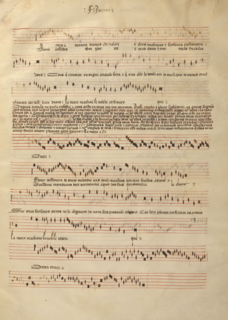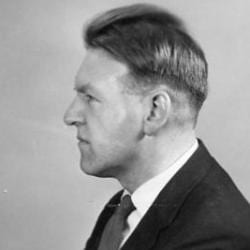
Josquin Lebloitte dit des Prez was a composer of High Renaissance music, variously described as 'French' or 'Franco-Flemish'. A central figure of the Franco-Flemish School, Josquin is considered among the greatest composers of the Renaissance and had a profound influence on the music of 16th-century Europe. Building on the work of his predecessors Guillaume Du Fay and Johannes Ockeghem, he developed a complex style of expressive—and often imitative—polyphony which informs much of his work. In addition, he increased emphasis on the relationship between text and music, and departed from the early Renaissance emphasis on melismatic lines, preferring to use shorter, repeated motifs between voices. A singer himself, Josquin's compositions are chiefly vocal, including masses, motets and a variety of secular chansons.

Gilles de Bins dit Binchois was a Franco-Flemish composer of early Renaissance music. A central figure of the Burgundian School, Binchois and his colleague Guillaume Du Fay were deeply influenced by the contenance angloise style of John Dunstaple. His efforts in consolidating a 'Burgundian tradition' would be important in the formation of the Franco-Flemish School. One of the three most famous composers of the early 15th century, Binchois is often ranked behind Du Fay and Dunstable by contemporary scholars, but his works were still widely cited, emulated and used as source material after his death.

Johannes Ockeghem was a Franco-Flemish composer and singer of early Renaissance music. Ockeghem was the most influential European composer in the period between Guillaume Du Fay and Josquin des Prez, and he was—with his colleague Antoine Busnois—the leading European composer in the second half of the 15th century. He was an important proponent of the early Franco-Flemish School.

Guillaume Du Fay was a French composer and music theorist of the early Renaissance. He is considered the leading European composer of his time, during which his music was widely performed and copied. He was well-associated with composers of the Burgundian School, particularly his colleague Gilles Binchois, but was never a regular member of the Burgundian chapel himself. Like Binchois, Du Fay was deeply influenced by the contenance angloise style of John Dunstaple, and synthesized it with a wide variety of other styles, including that of the famous Missa Caput, and the techniques of his younger contemporaries Johannes Ockeghem and Antoine Busnois.
A chanson is generally any lyric-driven French song, though it most often refers to the secular polyphonic French song of late medieval and Renaissance music. The genre had origins in the monophonic songs of troubadours and trouvères, though the only polyphonic precedents were 16 works by Adam de la Halle and one by Jehan de Lescurel. Not until the ars nova composer Guillaume de Machaut did any composer write a significant number of polyphonic chansons.

F. Andrieu was a French composer in the ars nova style of late medieval music. Nothing is known for certain about him except that he wrote Armes, amours/O flour des flours, a double ballade déploration, for the death of Guillaume de Machaut in 1377. The work has been widely praised and analyzed; it is notable for being one of two extant medieval double ballades for four voices, the only known contemporary musical setting of Eustache Deschamps and the earliest representative of the longstanding medieval and Renaissance lamentation tradition between composers. He may be the same person as Magister Franciscus, although the scholarly consensus on this identification is unclear. With P. des Molins, Jehan Vaillant and Grimace, Andrieu was one of the "post-Machaut" generation whose pieces retain enough ars nova qualities to be differentiated from composers of ars subtilior.

Antoine Busnois was a French composer, singer and poet of early Renaissance music. Busnois and colleague Johannes Ockeghem were the leading European composers of the second half the 15th century, and central figures of the early Franco-Flemish School.
Gustave Reese was an American musicologist and teacher. Reese is known mainly for his work on medieval and Renaissance music, particularly with his two publications Music in the Middle Ages (1940) and Music in the Renaissance (1954); these two books remain the standard reference works for these two eras, with complete and precise bibliographical material, allowing for almost every piece of music mentioned to be traced back to a primary source.
Gaspar van Weerbeke was a Netherlandish composer of the Renaissance. He was of the same generation as Josquin des Prez, but unique in his blending of the contemporary Italian style with the older Burgundian style of Dufay.

Franchinus Gaffurius was an Italian music theorist and composer of the Renaissance. He was an almost exact contemporary of Josquin des Prez and Leonardo da Vinci, both of whom were his personal friends. He was one of the most famous musicians in Italy in the late 15th and early 16th centuries.
Johannes Regis was a Netherlandish composer of the Renaissance. He was a well-known composer at the close of the 15th century, was a principal contributor to the Chigi Codex, and was secretary to Guillaume Dufay.
Fauxbourdon – French for false drone – is a technique of musical harmonisation used in the late Middle Ages and early Renaissance, particularly by composers of the Burgundian School. Guillaume Dufay was a prominent practitioner of the form, and may have been its inventor. The homophony and mostly parallel harmony allows the text of the mostly liturgical lyrics to be understood clearly.

Baude Cordier was a French composer in the ars subtilior style of late medieval music. Virtually nothing is known of Cordier's life, aside from an inscription on one of his works which indicates he was born in Rheims and had a Master of Arts. Some scholars identify him with Baude Fresnel, a harpist and organist in the court of Philip the Bold, though other scholars have rejected this.
In Renaissance music, the cyclic mass was a setting of the Ordinary of the Roman Catholic Mass, in which each of the movements – Kyrie, Gloria, Credo, Sanctus, and Agnus Dei – shared a common musical theme, commonly a cantus firmus, thus making it a unified whole. The cyclic mass was the first multi-movement form in western music to be subject to a single organizing principle.

A paraphrase mass is a musical setting of the Ordinary of the Mass that uses as its basis an elaborated version of a cantus firmus, typically chosen from plainsong or some other sacred source. It was a common means of mass composition from the late 15th century until the end of the 16th century, during the Renaissance period in music history, and was most frequently used by composers in the parts of western Europe which remained under the direct control of the Roman Catholic Church. It is distinguished from the other types of mass composition, including cyclic mass, parody, canon, soggetto cavato, free composition, and mixtures of these techniques.
Marbrianus de Orto was a Dutch composer of the Renaissance. He was a contemporary, close associate, and possible friend of Josquin des Prez, and was one of the first composers to write a completely canonic setting of the Ordinary of the Mass.

Adieu mes amours was a popular secular polyphonic chanson of the late 15th century. Many settings of this tune are in fact based on the c. 1480 setting by Josquin des Prez, in which the lower two voices are in quasi-canon, and the upper two voices are freer. The tune itself is in a simple ABA' form. It appeared in many manuscripts and prints from many countries, including in Ottaviano Petrucci's Odhecaton A.
Richard Loqueville was a French composer active during the transition between Medieval and Renaissance music. A musician at Cambrai Cathedral, Loqueville was a harpist and teacher, whose students included Edward III, Duke of Bar and the influential composer Guillaume Du Fay.

Gilbert Reaney was an English musicologist who specialized in medieval and Renaissance music, theory and literature. Described as "one of the most prolific and influential musicologists of the past century", Reaney made significant contributions to his fields of expertise, particularly on the life and works of Guillaume de Machaut, as well as medieval music theory.
El Grillo is a frottola by Josquin des Prez. Possibly written in the early 16th century, it is regarded as one of Josquin's most popular works.










